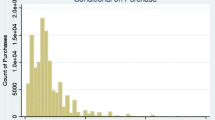Abstract
Economists have long debated how advertising should be treated in a rational-choice framework. Using unique data from the broadcast networks’ 1995 Fall Network Season, we find that sitcoms attract premia from advertisers, while news and police programs get discounted. We interpret our findings according to two important theoretical treatments of advertising. Because the broadcast networks forgo advertising-unfriendly program content, the cable channel HBO responds with a deliberate counter-programming niche strategy, explicitly airing programming with “darker” and “more difficult” advertising-unfriendly content.
Similar content being viewed by others
References
Anderson, Simon, and Coate, Stephen (2000) ‘Market Provision of Public Goods: The Case of Broadcasting’, NBER Working Paper 7513.
Terry Anderson Peter Hill (1975) ArticleTitle‘The Evolution of Property Rights: A Study of the American West’ Journal of Law and Economics 18 IssueID1 163–178
Gary Becker Kevin Murphy (1993) ArticleTitle‘A Simple Theory of Advertising as a Good or a Bad’ Quarterly Journal of Economics 108 IssueID4 941–964
Keith Brown Robert Cavazos (2002) ArticleTitle‘Network Revenues and Minority Television Programming’ Journal of Media Economics 15 IssueID4 227–239 Occurrence Handle10.1207/S15327736ME1504_1
Evans, Phillip B., and Wurster, Thomas (1997) ‘Strategy and the New Economics of Information’, in Phillip B. Evans and Thomas S. Wurster (eds.), Harvard Business Review, September 1, 1997.
Franklin Fisher John McGowan David Evans (1980) ArticleTitle‘The Audience-Revenue Relationship for Local Television Stations’ The Bell Journal of Economics 11 IssueID2 694–708
Friend Tad (2001). ‘The Next Big Bet’. The New Yorker, May 14, 2001.
J Gabszewicz Didier Laussel Nathalie Sonnac (1999) ‘TV-Broadcasting Competition and Advertising’ CORE mimeo
Goettler, Ronald (1999) ‘Advertising Rates, Audience Composition, and Competition in the Network Television Industry’. GSIA Working Paper No. 1999-E28.
Ronald Goettler Ron Shachar (2000) ‘Spatial Competition in the Network Television Industry’ Carnegie Mellon University mimeo
Barry Seldon Chulho Jung (1993) ArticleTitle‘Derived Demand for Advertising Messages and Substitutability among the Media’ Quarterly Review of Economics and Finance 33 IssueID1 71–86 Occurrence Handle10.1016/1062-9769(93)90029-J
Ron Shachar Emerson Jay (2000) ArticleTitle‘Cast Demographics, Unobserved Segments, and Heterogenious Switching Costs in a Television Viewing Choice Model’ Journal of Marketing Research 37 IssueID2 173–186 Occurrence Handle10.1509/jmkr.37.2.173.18738
Alvin Silk Lisa Klein Ernst Berndt (2002) ArticleTitle‘Intermedia Substitutability and Market Demand by National Advertisers’ Review of Industrial Organization 20 IssueID4 323–348 Occurrence Handle10.1023/A:1015653227386
Michael Spence Bruce Owen (1977) ArticleTitle‘Television Programming, Monopolistic Competition, and Welfare’ Quarterly Journal of Economics 91 IssueID1 103–126
Peter Steiner (1952) ArticleTitle‘Program Patterns and Preferences, and the Workability of Competition in Radio Broadcasting’ Quarterly Journal of Economics 66 IssueID2 194–223
Cass Sunstein (1999) ‘Private Broadcasters and the Public Interest: Notes Toward a ‘Third Way’ University of Chicago mimeo
Author information
Authors and Affiliations
Corresponding author
Additional information
“The networks have essentially by given up on viewers with functional IQ’s.” – Dean Valentine, President of UPN
The views in this paper are my own and do not represent the views of the Federal Communications Commission, its Commissioners, or its staff.
Rights and permissions
About this article
Cite this article
Brown, K., Cavazos, R. Why is This Show so Dumb? Advertising Revenue and Program Content of Network Television. Rev Ind Organ 27, 17–34 (2005). https://doi.org/10.1007/s11151-005-4836-6
Issue Date:
DOI: https://doi.org/10.1007/s11151-005-4836-6




